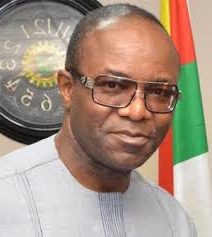He affirmed that there were many advantages in patronizing the local market, adding, “Nigerian companies will get the first right of refusal. We will procure anything that is available in Nigeria.”
Browsing: Nigerian Content Development and Monitoring Board
The intent is to promote the participation of genuine community contractors in oil and gas projects and integration of communities in the industry value chain as part of the strategy to grow the local economy and promote peace and tranquility in the communities.
The FPSO is the biggest component of a deepwater oil and gas project and the fabrication and integration of the modules at any location spurs multi-dimensional development and creates thousands of jobs.
Admitting that the company had defaulted in complying with some provisions of the Act in the past, McGrath who was appointed in March 2017 assured that the oil giant would henceforth comply with all provisions of the Act alongside associated regulations.
Meanwhile, an outlook of upcoming activities across the upstream, midstream, and downstream sectors of the Nigerian oil and gas industry would be out in two weeks according to the Nigerian Content Development and Monitoring Board (NCDMB).
He underscored the importance of the Egina project to the Nigerian economy, particularly the addition of 200,000 barrels to the country’s daily crude oil production. Egina will also contribute to the Federal Government’s commitment to address production decline and shore up national revenue.
He explained that the principle of corporate governance has been stretched a notch higher with prompt remittances of oil and gas revenue into the Federation Account while it is also a matter of public knowledge that the Corporation has embraced fully the practice of conducting open public bid exercises in sourcing service providers and suppliers for day to day operational requirements.
He confirmed that in-country integration of the FPSO and fabrication of six modules of the vessel created 5000 direct jobs and 5000 indirect jobs. Increased domiciliation of future FPSO projects through the fabrication of more modules would create additional jobs, estimated to reach 30,000, he added.
According to him, the visits to operating and service companies around the country were conceived to engage stakeholders, and explain strategies adopted by the NCDMB to foster projects and ensure domiciliation of work scopes and maximization of in-country capacities.
He said, “The focus of the Board compliance monitoring had focused largely on the upstream sector operations of the industry, mainly because of the higher percentage spend in the sub-sector. In 2017, we have reorganised our monitoring structures and will pay much more attention to the implementation of Nigerian Content in the midstream and downstream sectors of the industry.”








